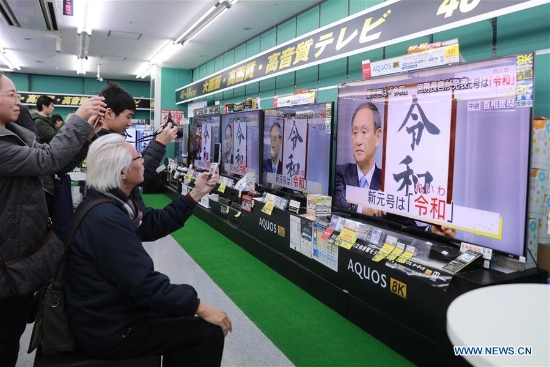
People watch a TV broadcast about Japan's Chief Cabinet Secretary Yoshihide Suga holding aloft a framed picture of "Reiwa", the name of Japan's new era, during a press conference in Tokyo, Japan, April 1, 2019. The Japanese government announced Monday that "Reiwa" will be the name of Japan's new era to start on May 1, when Crown Prince Naruhito ascends the Chrysanthemum throne succeeding his father Emperor Akihito. The new era name, comprised of two Chinese characters, which roughly translate to "orderly" or "auspicious" and "peace" or "harmony," is derived from Man'yoshu, the oldest anthology of Japanese poetry dating back to the eighth century. (Xinhua/Du Xiaoyi)
TOKYO, April 1 (Xinhua) -- The Japanese government announced Monday that "Reiwa" will be the name of Japan's new era to start on May 1, when Crown Prince Naruhito ascends the Chrysanthemum throne succeeding his father Emperor Akihito.
The new era name, comprised of two Chinese characters, which roughly translate to "orderly" or "auspicious" and "peace" or "harmony," is derived from Man'yoshu, the oldest anthology of Japanese poetry dating back to the eighth century.
Japanese Prime Minister Shinzo Abe told a press conference after the announcement was made that the new era name was decided upon as it connotes "people's hearts coming together beautifully to nurture a culture."
"The name Reiwa means that culture is born and grows when people come together and care for each other beautifully," Abe said, adding that he hopes the new era ahead would be one that held great promise for the younger generations.
The announcement of the new era name was officially made by Japan's Chief Cabinet Secretary Yoshihide Suga by way of initially holding aloft a framed picture of the two Chinese characters painted in traditional calligraphy.
"We expect the new era to be widely accepted by the public and deeply rooted in the lives of Japanese people," Suga, Japan's top government spokesperson, said.
The new era name, a closely guarded secret that has kept the public here guessing for months, was greeted by a highly expectant nation, including thousands gathering on the streets in front of large screens.
"'Reiwa' sounds really beautiful and it's easy to write in kanji," Haruna Kameda, an elementary school teacher in her 40s told Xinhua.
"I was born in the Showa era, grew up in Heisei and now I'm going to live in Reiwa," Kameda, who works in Tokyo's Meguro ward, said happily.

